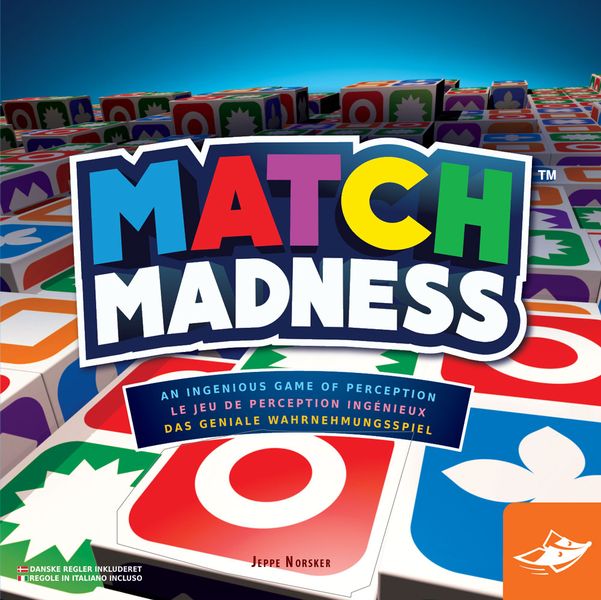Match Madness (2016) Board Game
Match Madness is a fast-paced board game that was released in 2016 by FoxMind. Designed by Jeppe Norsker and illustrated by Karl Malepart, this game is suitable for players aged 7 and above. It falls under the categories of Action / Dexterity, Deduction, Puzzle, and Real-time, with a main gameplay mechanic being pattern recognition.
Game Components of Match Madness
How To Setup Match Madness
To set up Match Madness, start by scrambling the blocks and placing the pattern cards face down in a single stack for Quick Play, or into five distinct face-up piles for Total Madness. Each pile in Total Madness is arranged by difficulty, with cards worth 1 to 3 points each.
Gameplay Mechanics and Game Objective
– Players simultaneously try to arrange their blocks to match the revealed pattern card.
– The first player to match the pattern grabs the card and keeps it.
– The game continues until all cards are claimed, with the player collecting the most cards declared the winner.
– Players attempt to match any of the face-up cards on the table.
– When a player believes they have a match, they yell “Match!” and point to the card.
– If the arrangement is correct, the player takes the corresponding card; if incorrect, they lose a previously completed card.
– The game ends when all cards are claimed, with the player having the most points declared the winner.
Player Experience
Match Madness is a fast-paced, tactile game that challenges players to recreate patterns quickly and accurately. The game is intense, with players often feeling flustered and frustrated as they spin, turn, and slide their blocks to match the patterns. However, for those who enjoy puzzles like Rubik’s Cube and tangrams, Match Madness can be highly engaging and enjoyable.
Pros
Cons
Personal Thoughts on Match Madness
Match Madness is ideal for those who thrive on speed and puzzle-solving. If you enjoy the challenge of recreating patterns quickly and outsmarting your opponents, this game is perfect. However, if the idea of repeatedly spinning and arranging blocks does not appeal to you, you might find the game less engaging. It is particularly great for families and younger players looking to develop their cognitive skills, but it may not be the best fit for players seeking more complex gameplay or strategic depth.
We are supported by our audience. When you purchase through links on our site, we may earn an affiliate commission, at no extra cost for you. Learn more.

